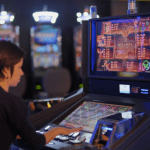Gaming has come a long way from simple pixelated graphics and linear storylines. It has evolved exponentially with advancements in the technology powering cutting-edge graphics, immersive storylines, and competitive multiplayer experiences.
Amidst this changing landscape, blockchain technology has emerged to disrupt the traditional gaming model by introducing innovations like true ownership of in-game assets and play-to-earn mechanics.
This article dives into the critical differences between traditional games and blockchain games while exploring unique perspectives on gameplay experiences, financial aspects, community engagement, and prospects.

Gameplay Experience
Traditional games have long captivated players with their rich narratives, breathtaking graphics, and engaging gameplay mechanics. From classics like Super Mario Bros to modern masterpieces like The Witcher 3 and online casino games, they offer an escape into vibrant virtual worlds filled with exciting challenges and memorable characters.
On the other hand, blockchain games leverage decentralized technology to provide novel gameplay experiences that blur the lines between entertainment and investment. By offering true ownership of in-game assets through non-fungible tokens (NFTs), players can buy, sell or trade these assets seamlessly across platforms without intermediaries. Furthermore, play-to-earn models enable gamers to earn real-world value by participating in various game activities.
However, most blockchain games still fail to deliver an immersive experience on par with traditional titles. Most current offerings need the graphical fidelity or complex narratives that define AAA gaming experiences. As developers continue experimenting with new ways to incorporate blockchain elements into their projects, this gap may narrow over time.
Monetization Methods and Economic Impact
Since its inception as a niche entertainment medium for hobbyists and tech enthusiasts, gaming has grown into a behemoth industry generating billions in revenue annually through various monetization methods such as subscriptions, microtransactions, and in-game advertising. These practices have been widely adopted across single and multiplayer titles, allowing developers to maintain a steady income stream while providing new content and experiences for players.
Contrastingly, blockchain games rely on tokenomics and NFT-based transactions to generate revenue. By pegging in-game assets to cryptocurrencies or crypto tokens, blockchain game developers can create a thriving ecosystem where players can buy, sell or trade items for real-world value. This approach not only drives player engagement but also creates unique earning opportunities for dedicated gamers.
The sheer profitability of NFT sales in games showcases the potential of blockchain gaming as a lucrative market segment. As more developers explore integrating these innovative financial mechanisms into their projects, we may witness a shift in how traditional games are monetized.
Community Engagement and Ecosystem Development
Community involvement has always been crucial in shaping the popularity of traditional games. Esports tournaments, fan communities, and streaming platforms like Twitch have all played vital roles in elevating gaming from a niche pastime to mainstream entertainment.
However, blockchain games take community engagement one step further by leveraging decentralized governance models that enable players to actively participate in decision-making processes that shape their game worlds directly. This is done through smart contracts and voting mechanisms tied to platform-specific tokens.
As both types of gaming continue evolving, it will be interesting to observe how competition or collaboration between these different communities unfolds. Perhaps we’ll see traditional studios exploring decentralized options or blockchain developers partnering with established brands to push the boundaries of what’s possible within the medium.
Future Prospects of Traditional and Blockchain Gaming
The rise of blockchain technology has created exciting opportunities for growth and innovation within the gaming industry. As tokenomics gain traction and NFT sales soar into billions, it’s worth pondering how the future relationship between traditional games and blockchain gaming might develop.
One possibility is the integration of blockchain elements into existing franchises or established genres, enabling players to trade in-game assets or participate in decentralized marketplaces securely. However, this would require careful consideration from developers to ensure that introducing these features keeps the core gameplay experience intact.
Another scenario envisions a parallel evolution where traditional and blockchain gaming coexist while catering to different player demographics and preferences. As each segment grows and evolves independently, it may eventually converge or diverge further, ultimately shaping the future landscape of the gaming industry as we know it.
Conclusion
While traditional games dominate today’s revenue and player base market, blockchain games are rapidly gaining traction by offering innovative gameplay experiences that merge entertainment with investment opportunities. IAs such, we may witness an even more significant shift in the global gaming landscape driven by unique insights gleaned from comparing these two distinct forms of interactive entertainment.
Join 25,000+ smart readers—don’t miss out!






